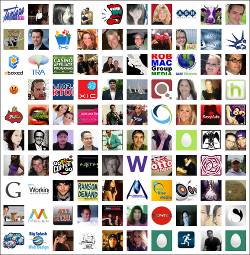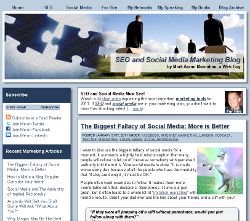
Have you ever felt so sick of people feeding you lies about marketing that you can still taste it the next morning? Those lies often leave us, as a society, with a bad taste in our mouth for the whole concept of marketing. It creates a heightened level of cynicism that was not there before, and it spreads like a bad rash.
Isn’t it time to take inventory of what you’ve been accepting on faith, and start to question it? I think so, and I think it should apply to marketers and their clients alike. Of course, that will require a shift toward using due diligence and common sense. When you wonder if what you’ve been told is a lie, do you accept the responsibility to find the truth, or do you just give in and believe it because it is what you want to believe?
It is not my full-time job to be a whistle-blower about the abundance of bad marketing, but I’d say I definitely have a knack for it. I also have a sense of industry responsibility to balance out all the worthless junk and cons with some common sense and honesty … brutal honesty. Maybe I shouldn’t harp on it so much, but there are many instances when I see just how badly lies about online marketing can hurt a company. It is true that many marketing efforts can cause a net loss even greater than the upfront price paid.
I’ll wrap this up with a real life example of a company that was scammed for many thousands of dollars, but this is also about the course that brings them to accept their defeat rather than fight back. I’ll begin with some observations, and I’ll include some links throughout this article to extended resources on related topics. You may like to give attention to those.
Convincing Evidence of a Marketing Decline
I am fully convinced that the majority of things people are promoting to fix your online marketing is a string of lies. I see it all the time that somebody lied to somebody else, and now they are out to sell it to you. I suspect that many of the people lying don’t even know they are lying … they believe what they have been told so completely that they actually see it as the truth. There is a huge component of the blind leading the blind, and taking inspiration from even the slightest of success stories they read about on the next amateur marketing blog. I can prove the concept, too … just have a good hard look at this piece about the sad state of SEO and social media marketing experts.
Consider this: How many times have you heard how important it is to use Facebook? I like Facebook just fine, and it can be very useful for marketing, but how much of what you hear is hyperbole and lies? After all, how much do you actually expect to buy from that guy on Facebook trying so hard to sell you his stuff? Do you think the answer is completely different if you asked him the same question about you?
This is not about Facebook, and I actually know for a fact that Facebook can play an amazing role in a marketing strategy. Facebook has performed wonderfully for my wife’s cakes and confections company (of course, she is far sweeter than I am), and it has become invaluable to many of my clients. What I am very unsettled about is the utter loss of common sense I see surrounding “miracle cures” like Facebook, Twitter, blogs, and the rest of the wagon full of assorted snake oils.
Sure, maybe snakes have great oil, but do you rub it on your feet, fry with it, put it in your bath, or what? There is no perfect single-source cure for your every marketing objective, and it takes much more than just showing up! It is important to note that “everybody” is not your target market, but that’s how I see a majority of marketers promoting marketing these days. If you are hoping to earn squillions of dollars, or even a few dollars, just by being on Facebook without a strategy, you will be disappointed. Let’s try to be more realistic … please!
For your enjoyment, I have included a video about lying.
It is easy to see how the industries related to marketing a business online became so hard to trust. After all, who doesn’t want a commission … a job … a paycheck? Many people will lie to get those things. You will find a massive abundance of them in marketing … especially online marketing. The end result is that it does not matter if the lies are due to ignorance or greed. Lies are lies, and there are no innocent lies, nor innocent victims, as long as the truth is available. There are just the willingly confused.
Great Marketing Professionals Are Not Just Mythical
I’ve got to say that there are some amazing marketing people out there. There are also many of them with a lot of integrity. I know they exist, because I’ve met many of them. I’ve also trained many of them. The trouble is that the field of marketing was flooded with newcomers like a tsunami. Now that it all looks so “easy” to reach a huge audience online, there is little wonder why everybody wants to be an expert. It is a mathematical truth that most of them are not, and will never be very good at marketing. Marketing takes training, it takes experience, and it takes aptitude, but since the majority of today’s online marketing newcomers have very little of these things, they lie … even to themselves. I suppose it must seem easier to lie than to go through the hard process of working and learning their way to the top. Only the few with high integrity and strong work ethic will survive in the long run, but there is a constant flow of new liars … so look out!
There is also a huge audience who are swallowing those lies like a free bacon sandwich and washing them down like sucking free grape soda through a garden hose. It is maddening that they are in even greater abundance than the lying newcomers shamelessly taking their money. They are getting more gun-shy with each leap of faith, so it makes me wonder what it will look like when the whole thing collapses like a house of cards, and there is nobody left to believe it when they actually do encounter the truth. Have you seen the housing market? Most people thought that would never collapse, but it did!
The Marketing Con Job I Promised
I told you I’d wrap this up with an example of a company that was scammed. In this case, it is a friend of my friend and colleague. It is driving him nuts to see his friends get ripped off, so he asked me to help.
The company is paying thousands of dollars per month for search engine optimization services. They have previously paid multiple SEO companies to optimize their law firm websites to reach their target market, but each time, the results were just as bad. They have largely lost faith that online marketing can help them at all, but at the same time, they are strangely afraid to stop sending the checks … just in case.
The latest rip-off has performed so horribly that more than five months into their $36,000 contract, they are receiving under 30 monthly website visits that are even from the same country as where they provide their legal services. The last report I saw showed just over 600 monthly website visits from Southeast Asia, while only 28 were from within the United States. When the law firm asked for a list of the work performed, the marketing company replied with what one could logically estimate at under an hour of work … total … after months of being paid thousands of dollars per month.
The law firm has said they want my help, but they are “waiting it out” to see if the crooked SEO provider will do right by them. It becomes really upsetting as I consider how frequently I hear stories just like this. They keep hoping the lies will somehow miraculously become the truth, even when they have been presented with concrete proof that the SEO company is actually hurting their efforts … quite likely well into the future.
What do you think? Why do people allow themselves to be ripped off? Should marketing companies be willing to lie, just because it is how others do it? Shouldn’t we all use more due diligence and common sense? Am I doing this all wrong by trying to be honest in a dishonest world?
Please answer me!
P.S.
If you question how it can possibly be the majority of marketing that is plagued with lies, be sure to notice that there is a lot more marketing that you never see than what you do see … but yet, somebody is paying for it.
Podcast: Play in new window | Download



